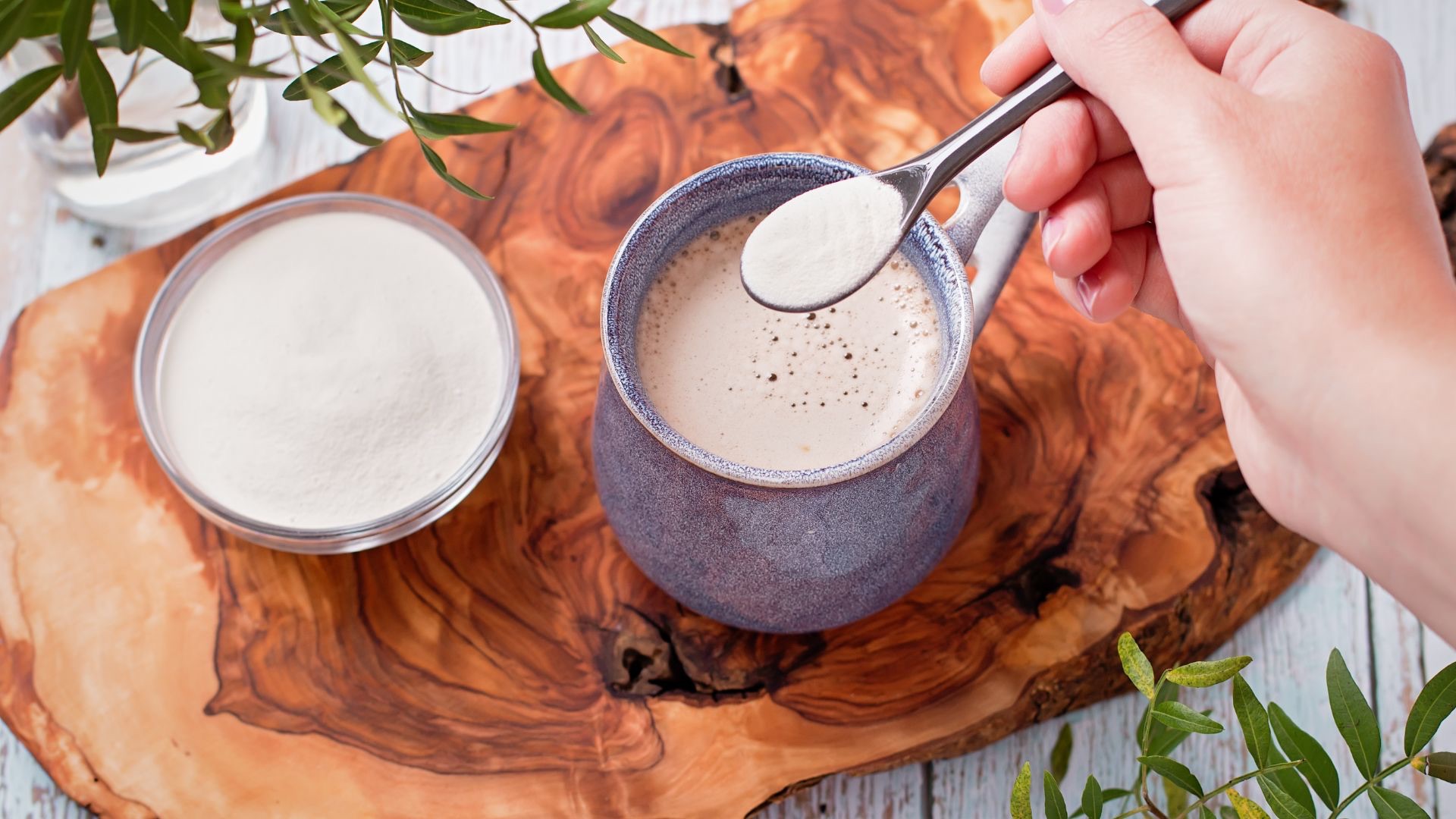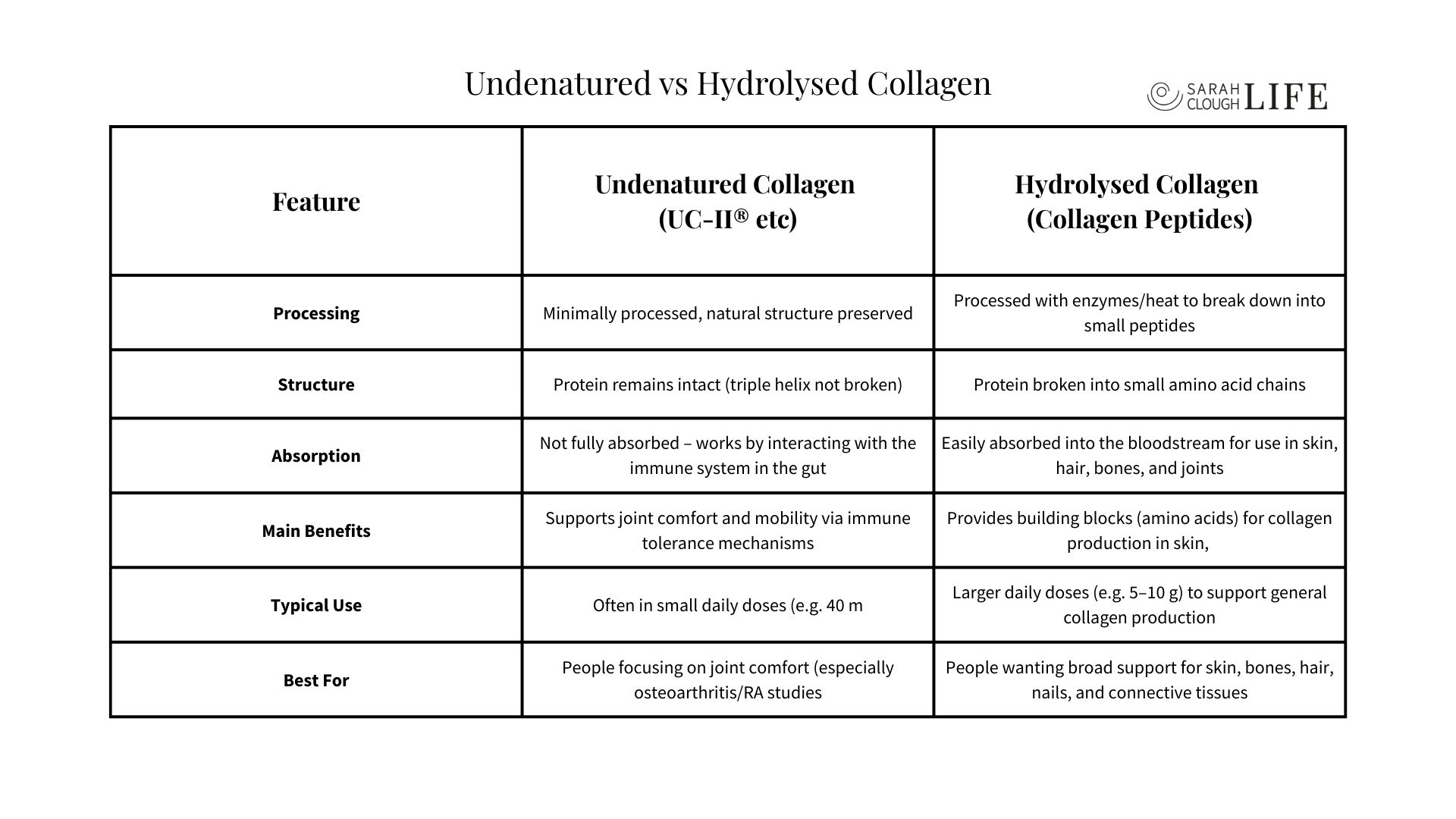Do collagen supplements help bones and joints (or is food + training better)?
Aug 26, 2025
The short answer is that collagen can help a little - mainly with knee pain and (in one 12-month trial) small bone-density gains in postmenopausal women. But it’s an adjunct, not the main event. For stronger bones and happier joints, training PLUS enough protein PLUS calcium & vitamin D are what are required.
What’s realistic to expect
- Bones: A year-long RCT (randomised control trial) in postmenopausal women taking 5 g/day specific collagen peptides showed modest BMD (bone mineral density) increases at the spine and hip vs placebo. So, whilst it’s useful it isn’t a magic wand.
- Joints: Updated meta-analyses of RCTs suggest collagen derivatives (hydrolysed peptides or undenatured type-II collagen) can reduce knee osteoarthritis pain a bit more than a placebo. Obviously this is helpful for symptoms but it isn’t a cure.
Guidelines reality check: UK guidance puts exercise (plus weight management if needed) at the core of osteoarthritis care; supplements are optional extras. For osteoporosis risk, evidence-based meds PLUS lifestyle changes are used when indicated.
What actually works (and where collagen fits)
1) Bones: load them, then “feed” the work
- Progressive strength + some impact tells bones to adapt. Recent reviews confirm exercise can raise BMD in postmenopausal women (they may be small but they are meaningful changes).
- Protein: many adults 50+ do best around ~1.0–1.2 g/kg/day, spread across meals.
- Calcium & vitamin D (UK): aim for ~700 mg/day calcium from food; most people benefit from 10 µg (400 IU) vitamin D/day … especially in winter.
- Where collagen fits: as a top-up (e.g. 5-10 g/day peptides) alongside the plan above - not instead of it. That RCT used 5 g/day.
2) Joints: move them, then consider add-ons
- Non-negotiables: therapeutic exercise (strength + cardio), education, and (if needed) weight management.
- Collagen as an adjunct: meta-analyses show modest pain / function improvements in knee osteoarthritis (OA). If symptoms are stopping you training, a collagen trial may help you keep moving.
3) Tendons & ligaments: a clever timing trick
A small crossover RCT found 15 g gelatin + ~50 mg vitamin C ~1 hour before exercise boosted a marker of collagen synthesis - handy when rehabbing tendons/ligaments.
Choose wisely
- Collagen isn’t a complete protein. It lacks tryptophan, so it can’t replace high-quality proteins for muscle building. Think of collagen as “in addition to” not “instead of.”
- Common types & doses you’ll see:
- Hydrolysed collagen peptides (type I/III): often 5–10 g/day (bone/joint trials commonly sit here).
- Undenatured type-II collagen (UC-II): ~40 mg/day in knee-OA trials. (*See table below*)
A simple, safe way to test it (8–12 weeks)
- Food first: hit your protein target; include calcium-rich foods; take daily vitamin D if advised.
- Training plan: at least 2-3 strength sessions/week (hinge, squat, push, pull, carry) + balance; add impact at your level if appropriate.
- If you trial collagen:
- Joints: try 10 g/day peptides or 40 mg/day UC-II; and keep training.
- Tendon days: 15 g gelatin + vitamin C ~1 hour pre-session.
- Choose third-party tested products (e.g., NSF/USP/Informed-Sport).
- What not to do: swap collagen for proven OA care or osteoporosis meds if you need them. Follow UK guidance for those decisions.
How to tell if it’s helping
- Pain & function: track walking distance, stairs, sit-to-stand, and day-to-day pain each week; reassess at 8-12 weeks.
- Strength & steadiness: note loads / reps and balance time.
- Bone: if you’re osteopenic / osteoporotic, discuss DEXA timing with your clinician (often 1-3 years) and focus on function in the meantime.
Further reading
- NICE (UK) Osteoarthritis NG226 -core treatments = exercise + weight management; meds / supplements are add-ons.
- NOGG 2024 - UK guideline for osteoporosis assessment and treatment.
- Collagen & BMD trial (12 months, 5 g/day): details & limitations.
- Collagen for knee OA pain (updated meta-analysis): effect sizes and study quality.
- Protein for older adults (ESPEN): practical 1.0–1.2 g/kg/day target.
- NHS (UK) vitamin D & calcium: clear daily targets.
This is for education only - please always personalise with your GP / physio if you have a diagnosis, new pain, or are considering medication.

Download Now: 5 Ways to Strengthen Your Bones Naturally
Forget fear-based messaging and outdated advice. This free guide gives you 5 intelligent, science-informed strategies to support strong, healthy bones, without extremes.
We hate SPAM. We will never sell your information, for any reason.


